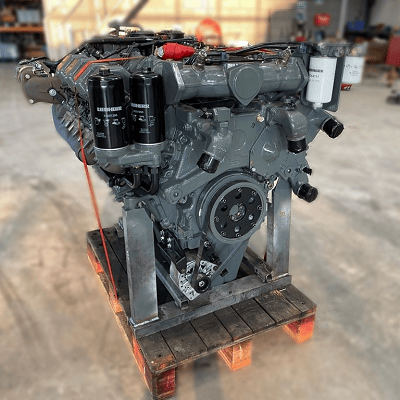The process of a dyno test on a Liebherr engine

When it comes to heavy machinery, reliability and power are paramount. Liebherr, a name synonymous with innovation and excellence in engineering, stands tall as a pioneer in the realm of heavy equipment and machinery. From towering cranes to robust excavators, Liebherr’s engineering prowess extends to the heart of these machines. We delve into the world of dyno testing a Liebherr engine, uncovering the meticulous process behind unleashing the raw power concealed within.
The foundation of excellence
Before we embark on the journey of dyno testing, it’s crucial to understand the foundation upon which Liebherr engines are built. With decades of engineering expertise and commitment to quality, Liebherr engines are crafted to withstand the most demanding environment and deliver unparalleled performance. Each component is meticulously designed and rigorously tested to ensure reliability, efficiency and longevity.
The process
1 Preparation: The engine undergoes meticulous preparation before being mounted onto the dynamo meter. This includes ensuring all connections are secure, fluids are filled to the appropriate levels, and sensors are properly calibrated.
2 Mounting: The engine is carefully mounted onto the dynamometer, a specialized device designed to simulate real-world operating conditions. Precision is paramount during this step to ensure accurate results.
3 Initial checks: Once mounted, a series of initial checks are conducted to verify proper alignment, connection integrity, and functionality of all engine systems.
4 Warm-up: The engine is started and allowed to warm up to operating temperature. This ensures consistent results and minimizes the risk of damage during testing.
5 Baseline testing: With the engine warmed up , baseline tests are conducted to establish initial performance metrics. This includes measuring power output, torque, fuel consumption, and emissions at various RPM levels.
6 Load testing: The engine is subjected to progressively increasing loads to simulate different operating conditions, such as idle, partial load and full load. This allows engineers to assess performance across the entire operating range and identify any potential issues or optimization.
7 Data analysis: Throughout the testing process, data is continuously collected and analyzed in real-time. Advanced instrumentation and software are used to monitor performance metrics and identify trends or anomalies.
8 Optimazation: Based on the data analysis, adjustments may be made to optimize engine performance. This could involve fine-tuning fuel injection timing, adjusting air-fuel ratios, or optimize turbocharger boost pressure.
9 Validation: Once testing is complete, the results are meticulously reviewed and validated against predetermined criteria and specifications. Any deviations or anomalies are thoroughly investigated to ensure accuracy and reliability.
10 Reporting: Finally, a comprehensive report is generated detailing the results of the dyno testing, including performance metrics, observations, and any recommendations for further optimization or refinement.
The outcome of dyno testing
Dyno testing a Liebherr engine is more than just a routine procedure – it’s a testament to the unwavering commitment to excellence that defines Liebherr’s engineering philosophy. By subjecting their engines to rigorous testing and analysis, Liebherr ensures that each engine delivers the uncompromising performance, reliability, and efficiency that customers expect.
In conclusion, dyno testing a Liebherr engine is not just about measuring power output. It’s about unlocking the true potential of these remarkable engines and ensuring they exceed expectations in the most challenging environments imaginable.
Plastic material has revolutionized the manufacturing industry, becoming a cornerstone of countless products and applications worldwide. Our factory is a testament to this revolution, specializing in the production of a diverse range of plastic products using various types of plastic materials.
One of the most common and widely used plastics in our factory is PVC, or polyvinyl chloride. PVC is a versatile material with excellent durability, chemical resistance, and insulating properties. It is often used in the production of piping systems, window frames, cables, and various other items that require resistance to corrosion and weathering.
Beyond PVC, our factory also works with a broad array of plastic materials, each with its unique characteristics and uses. Polyethylene (PE) is another common plastic, known for its lightweight and toughness, making it ideal for packaging, containers, and piping. Polypropylene (PP) is highly resistant to heat and chemicals, finding applications in automotive parts, household goods, and medical devices.
We also work with engineering plastics such as nylon and polycarbonate. These materials offer superior strength and rigidity, making them suitable for high-performance applications like gears, bearings, and optical components. Additionally, thermoplastic elastomers (TPEs) combine the flexibility of rubber with the processability of plastics, making them ideal for gaskets, seals, and other parts that require both elasticity and durability.
The versatility of plastic materials allows us to create a wide range of products that cater to different industries and needs. Using various plastic pellets or granules, we can mold, extrude, or injection mold various products such as bottles, packaging films, pipes, cables, automotive components, electronic housings, and more.
Our factory is equipped with state-of-the-art machinery and skilled workers who have extensive knowledge in plastic processing. We employ precision engineering techniques to ensure that each product meets the highest standards of quality and performance.
Moreover, we are constantly exploring new plastic materials and technologies to stay ahead of the curve. We believe in continuous innovation and strive to bring the best possible solutions to our customers.
In conclusion, plastic material is the cornerstone of modern manufacturing, and our factory is proud to be a part of this revolution. With our expertise in plastic processing and diverse range of products, we are confident that we can fulfill your needs and deliver exceptional results. We invite you to explore our capabilities and discover how we can contribute to your success.
pvc injection molding machine,Abs Raw Material Particle,pvc molding machine,Recycled Plastic Raw Material
Ningbo Outai Plastic Machinery Technology Co.,Ltd , https://www.outacmachine.com